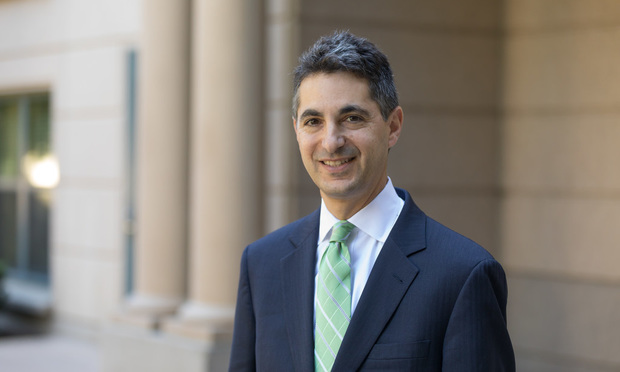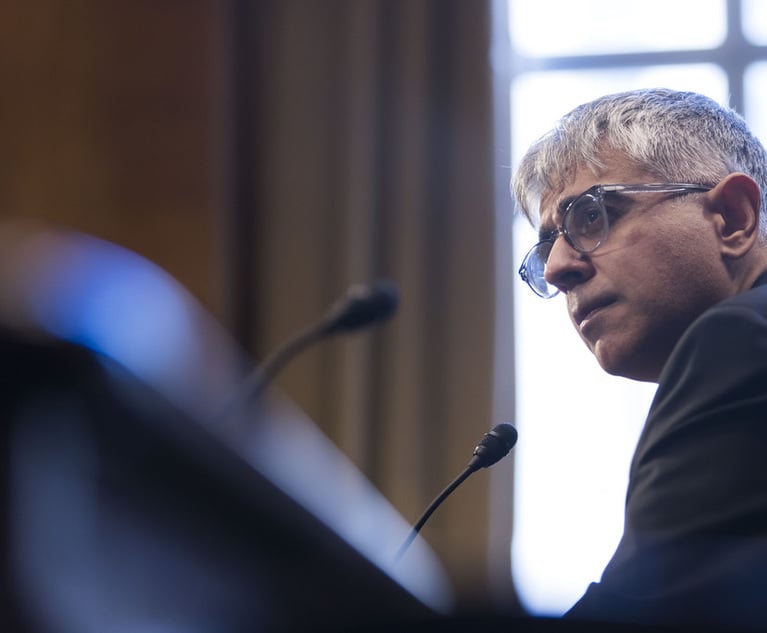 Chief Judge Leonard Stark of the U.S. District Court for the District of Delaware.Photo: Jason Doiy/ALM
Chief Judge Leonard Stark of the U.S. District Court for the District of Delaware.Photo: Jason Doiy/ALMAll Delaware Federal Court Employees Declared Essential as Shutdown Looms
According to memos posted Wednesday afternoon, all court employees would be considered "necessary and essential" to court functions, and civil and criminal trials would proceed as planned.
January 16, 2019 at 06:04 PM
4 minute read
The original version of this story was published on Delaware Law Weekly
Delaware's district and bankruptcy courts are set to remain open throughout the remainder of the partial shutdown of the federal government, with all court employees expected to report to work normally, even after emergency funds run out next week.
According to memos posted Wednesday afternoon, all court employees would be considered “necessary and essential” to court functions, and civil and criminal trials would proceed as planned.
The Administrative Office of U.S. Courts has estimated it has enough funds to sustain paid operations through Jan. 25. However, should the shutdown—now the longest in modern history—extend beyond that deadline, court staff would be required to work without pay until Congress restores funding. All employees would be entitled to back-pay once appropriations are finalized.
The directives apply to the U.S. District Court for the District of Delaware, the Probation Office for the District of Delaware and the District of Delaware Bankruptcy Court, though they are subject to modification at any time.
District Court Chief Judge Leonard P. Stark said in a “shutdown order” that criminal proceedings involving “potential deprivation of an individual's liberty” would be deemed most essential and will require additional court staff.
“The court will determine, on a case-by-case basis, action required on remaining pending civil and criminal cases,” he said in a two-page order. “All such matters, including cases classified by parties as emergent, will be referred to the assigned judge or duty judge for review and determination if emergency court action.”
Stark declined to provide additional comment Wednesday
According to the memos, jurors will be paid their usual fees, but payment may be delayed until after the shutdown is over. The courts, meanwhile, will continue to accept electronically filed documents, and the clerk's office will determine procedures for receiving and processing paper documents from pro se litigants.
During the last major shutdown in 2013, federal judges across the country declared all employees essential, going against the guidance of the Administrative Office, which had urged courts not to enter broad orders applying to staff.
Since the current shutdown started Dec. 22, the judiciary has been using court fees and other “no-year” funds to sustain its operations. The Administrative Office previously said it expected the funds to last through Jan. 18, but later adjusted the deadline due to aggressive efforts to reduce spending.
The Justice Department has pushed to pause many civil cases across the country in trial and appellate courts, arguing the federal Antideficiency Act generally precludes federal officials from working during a lapse in appropriations. There is an exception for cases involving human life and the protection of property.
But Wednesday's order from Delaware's federal courts makes no distinction between essential and nonessential workers in a relatively small district that sees an outsize share of filing, especially in the areas of bankruptcy and patent litigation.
“The United States District Court for the District of Delaware is a small court with a very busy and complex docket,” Stark's memo said.
A separate memo from Chief Judge Christopher S. Sontchi of the Delaware Bankruptcy Court mirrored Stark's guidance and described the district as “one of the busiest Chapter 11 courts in the country.”
Congress and President Donald Trump remain locked in a dispute over funding for Trump's plan to build a wall along the border separating the United States and Mexico. As of Wednesday evening, there was no indication on when the sides might reach an agreement to end the shutdown, now in its fourth week.
This content has been archived. It is available through our partners, LexisNexis® and Bloomberg Law.
To view this content, please continue to their sites.
Not a Lexis Subscriber?
Subscribe Now
Not a Bloomberg Law Subscriber?
Subscribe Now
NOT FOR REPRINT
© 2024 ALM Global, LLC, All Rights Reserved. Request academic re-use from www.copyright.com. All other uses, submit a request to [email protected]. For more information visit Asset & Logo Licensing.
You Might Like
View All
What Went Wrong With Adeel Mangi's Long, Strange Trip Through the Judicial Nomination Process?
6 minute read
Democrats Give Up Circuit Court Picks for Trial Judges in Reported Deal With GOP


FTC Goes After AI Tool That Has Capability to Mass Produce Fake Reviews
6 minute readTrending Stories
- 1The Key Moves in the Reshuffling German Legal Market as 2025 Dawns
- 2Social Media Celebrities Clash in $100M Lawsuit
- 3Federal Judge Sets 2026 Admiralty Bench Trial in Baltimore Bridge Collapse Litigation
- 4Trump Media Accuses Purchaser Rep of Extortion, Harassment After Merger
- 5Judge Slashes $2M in Punitive Damages in Sober-Living Harassment Case
Who Got The Work
Michael G. Bongiorno, Andrew Scott Dulberg and Elizabeth E. Driscoll from Wilmer Cutler Pickering Hale and Dorr have stepped in to represent Symbotic Inc., an A.I.-enabled technology platform that focuses on increasing supply chain efficiency, and other defendants in a pending shareholder derivative lawsuit. The case, filed Oct. 2 in Massachusetts District Court by the Brown Law Firm on behalf of Stephen Austen, accuses certain officers and directors of misleading investors in regard to Symbotic's potential for margin growth by failing to disclose that the company was not equipped to timely deploy its systems or manage expenses through project delays. The case, assigned to U.S. District Judge Nathaniel M. Gorton, is 1:24-cv-12522, Austen v. Cohen et al.
Who Got The Work
Edmund Polubinski and Marie Killmond of Davis Polk & Wardwell have entered appearances for data platform software development company MongoDB and other defendants in a pending shareholder derivative lawsuit. The action, filed Oct. 7 in New York Southern District Court by the Brown Law Firm, accuses the company's directors and/or officers of falsely expressing confidence in the company’s restructuring of its sales incentive plan and downplaying the severity of decreases in its upfront commitments. The case is 1:24-cv-07594, Roy v. Ittycheria et al.
Who Got The Work
Amy O. Bruchs and Kurt F. Ellison of Michael Best & Friedrich have entered appearances for Epic Systems Corp. in a pending employment discrimination lawsuit. The suit was filed Sept. 7 in Wisconsin Western District Court by Levine Eisberner LLC and Siri & Glimstad on behalf of a project manager who claims that he was wrongfully terminated after applying for a religious exemption to the defendant's COVID-19 vaccine mandate. The case, assigned to U.S. Magistrate Judge Anita Marie Boor, is 3:24-cv-00630, Secker, Nathan v. Epic Systems Corporation.
Who Got The Work
David X. Sullivan, Thomas J. Finn and Gregory A. Hall from McCarter & English have entered appearances for Sunrun Installation Services in a pending civil rights lawsuit. The complaint was filed Sept. 4 in Connecticut District Court by attorney Robert M. Berke on behalf of former employee George Edward Steins, who was arrested and charged with employing an unregistered home improvement salesperson. The complaint alleges that had Sunrun informed the Connecticut Department of Consumer Protection that the plaintiff's employment had ended in 2017 and that he no longer held Sunrun's home improvement contractor license, he would not have been hit with charges, which were dismissed in May 2024. The case, assigned to U.S. District Judge Jeffrey A. Meyer, is 3:24-cv-01423, Steins v. Sunrun, Inc. et al.
Who Got The Work
Greenberg Traurig shareholder Joshua L. Raskin has entered an appearance for boohoo.com UK Ltd. in a pending patent infringement lawsuit. The suit, filed Sept. 3 in Texas Eastern District Court by Rozier Hardt McDonough on behalf of Alto Dynamics, asserts five patents related to an online shopping platform. The case, assigned to U.S. District Judge Rodney Gilstrap, is 2:24-cv-00719, Alto Dynamics, LLC v. boohoo.com UK Limited.
Featured Firms
Law Offices of Gary Martin Hays & Associates, P.C.
(470) 294-1674
Law Offices of Mark E. Salomone
(857) 444-6468
Smith & Hassler
(713) 739-1250






